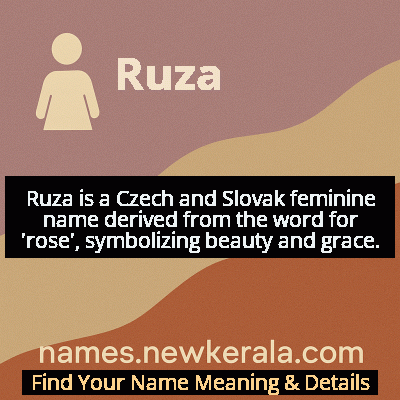Ruza Name Meaning & Details
Origin, Popularity, Numerology Analysis & Name Meaning of Ruza
Discover the origin, meaning, and cultural significance of the name RUZA. Delve into its historical roots and explore the lasting impact it has had on communities and traditions.
Name
Ruza
Gender
Female
Origin
Czechoslovakian
Lucky Number
3
Meaning of the Name - Ruza
Ruza is a Czech and Slovak feminine name derived from the word for 'rose', symbolizing beauty and grace.
Ruza - Complete Numerology Analysis
Your Numerology Number
Based on Pythagorean Numerology System
Ruling Planet
Jupiter
Positive Nature
Optimistic, inspirational, and creative.
Negative Traits
Scattered, exaggerating.
Lucky Colours
Yellow, gold, purple.
Lucky Days
Thursday.
Lucky Stones
Yellow sapphire.
Harmony Numbers
1, 2, 9.
Best Suited Professions
Arts, writing, communication.
What People Like About You
Creativity, optimism.
Famous People Named Ruza
Ružena Svobodová
Writer and Feminist
Prominent Czech writer and women's rights activist during the Czech National Revival
Ružena Dvořáková
Actress
Celebrated Czechoslovak film and theater actress from the 1930s-1960s
Ružena Nasková
Actress
Founding member of the National Theatre in Prague, important Czech actress
Ružena Hamáčková
Artist and Illustrator
Renowned Czech illustrator known for children's books and botanical art
Name Variations & International Equivalents
Click on blue names to explore their detailed meanings. Gray names with will be available soon.
Cultural & Historical Significance
Extended Personality Analysis
Women named Ruža are often characterized by a unique blend of traditional warmth and quiet strength, reflecting the dual nature of their namesake flower. They typically possess a deep emotional intelligence and sensitivity to beauty in their surroundings, often expressing themselves through artistic or creative channels. Ružas are known for their nurturing disposition and strong family values, making them excellent caregivers and community builders. Their personality combines practical wisdom with a romantic outlook—they can be both grounded in reality and dreamy in their aspirations. Many develop a keen aesthetic sense and may excel in fields requiring both creativity and attention to detail. Despite their gentle exterior, Ružas often demonstrate remarkable resilience when faced with adversity, much like roses that weather storms while maintaining their beauty. They tend to form deep, lasting relationships and value authenticity in their connections with others. Their communication style is typically thoughtful and considerate, often using metaphor and storytelling drawn from their rich cultural heritage.
Modern Usage & Popularity
In contemporary naming practices, Ruža occupies a unique space as both a traditional choice and a distinctive alternative to more common floral names. While its popularity peaked in the early 20th century, the name has experienced a notable revival since the 1990s as part of the broader trend toward historical and nature-inspired names. Current statistics from the Czech Ministry of Interior show approximately 15-20 newborn girls named Růžena annually, with the informal Ruža being used more frequently in daily life. The name maintains stronger popularity in Slovakia and among Czech diaspora communities, where cultural preservation remains important. Modern parents choosing this name often appreciate its connection to nature, cultural heritage, and its distinction from more international names. The name appeals particularly to educated urban families seeking meaningful names with historical depth. Social media and naming websites have contributed to its renewed visibility, with many young Ružas proudly sharing their name's cultural significance online. The name's versatility—working equally well in formal contexts as Růžena and casual settings as Ruža—adds to its contemporary appeal.
Symbolic & Spiritual Meanings
The symbolic meanings of Ruža extend far beyond its literal translation as 'rose,' encompassing rich layers of cultural and metaphorical significance. In Czechoslovak tradition, the rose represents the perfect balance between beauty and strength—its delicate petals protected by sharp thorns symbolize the harmony between gentleness and self-protection. The rose's blooming cycle mirrors human experiences of growth, flourishing, resting, and regenerating, making it a powerful symbol of resilience and transformation. In Christian symbolism prevalent throughout Central Europe, the rose represents the Virgin Mary and divine love, while in folk traditions, it signifies earthly passion and romantic devotion. The different colored roses carry specific meanings: red for passionate love and courage, white for purity and new beginnings, pink for gratitude and admiration, and yellow for friendship and joy. Metaphorically, the name Ruža suggests someone who brings beauty into the world while maintaining personal boundaries, who flourishes in adversity, and whose influence grows deeper with time—much like the rose's scent intensifies as it matures. This complex symbolism makes Ruža a name rich with positive connotations and aspirational qualities.

